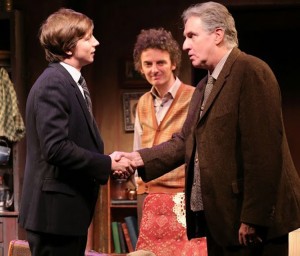The play takes place following a civil war, in which the brothers of Antigone, Eteocles and Polyneices, clashed. Heaney doesn’t delve into the source of the conflict: the brothers were to share the crown year by year, but Eteocles refused to step down when Polyneices’ turn came, and Polyneices took up arms against him. Both brothers have died in the deciding battle, and the leadership of Thebes is now in the hands of Creon, Antigone’s uncle and the brother of Jocasta—who may be remembered as both mother and grandmother to Antigone; her sister, Ismene; and their late brothers. Polyneices has been tarred as a traitor by Creon; he has declared that Eteocles will be buried as a hero, but Polyneices will be left unburied as carrion.
Heaney, who had reworked Philoctetes into a play, The Cure at Troy, in 1990, shows a keen sense of the drama in Antigone’s first words, underlining urgency and giving a streamlined sense of the conflict to come as well as the burden of the sisters’ history.
Ismene, quick, come here!
What’s to become of us?
Why are we always the ones?
There’s nothing, sister, nothing
Zeus hasn’t put us through
Just because we are who we are—
The daughters of Oedipus.
Compare that with the sedate 1962 translation by Michael Townsend:
My darling sister Ismene, we have had
A fine inheritance from Oedipus.
God has gone through the whole range of sufferings.
And piled them all on us—grief upon grief,
Humiliation upon humiliation.
Heaney sticks with “Zeus” for the flavor of the original, rather than a Christianized “God,” and his simpler language moves more swiftly. His version of the story sounds more energetic to the modern ear (though one wishes he had avoided use of the anachronistic “beyond the pale”—it occurs not once or twice, but three times). Omitting the traditional chorus, Heaney focuses on individual personalities and equalizes their weight, especially benefiting Winsome Brown’s helplessly distraught Eurydice.
The sisters’ dilemma is sparked by Paul O’Brien’s stern, autocratic Creon, whose edict demands death for anyone who buries Polyneices. His actions are an affront to the gods, and to Rebekah Brockman’s passionate, righteous Antigone. Katie Fabel’s Ismene is also upset but lacks the gumption to join Antigone in secretly burying their brother. To complicate matters, Antigone is betrothed to Haemon, Creon’s son (the intermarriage of the cousins in a family plagued by incest goes unremarked; after all, it’s long before blood work and DNA testing).
The cast, under the astute direction of Charlotte Moore, brings passion and fire to Heaney’s language. When Creon condemns Antigone for her actions and resists Haemon’s pleas to spare Antigone, Eurydice worries about the effect on Haemon, as well as her husband’s transgression of Greek custom. Yet Heaney’s virtue is that he simplifies as well, as in Ismene’s initial response to Antigone’s proposal: “Easy now, my sister/Think this through for a minute.” Or, also from Ismene, a passage that foregrounds a modern tension between chauvinism and feminism:
Women, defying Creon?
It’s not a woman’s place.
We’re weak where they are strong.
Because the Irish Rep is forced to use the DR2 Theatre during renovations to its 22nd Street home, and the cramped stage means Tony Walton’s set consists of a couple raised platforms and some decorative vertical roping, the actors must sidle off awkwardly. Nonetheless, the cast is solid, with Robert Langdon Lloyd’s blind seer Tiresias a sizzling standout. Colin Lane brings comic worry to the part of the guard who has let Antigone slip by and bury Polyneices—and then redeems himself with her capture. Curiously, he and Rod Brogan as the Messenger have pronounced Irish accents, which seem to mark them as a different class from the royals; but then Ciarán Bowling’s accent as the royal heir Haemon muddies the issue. Quibbles aside, even if this version of Sophocles feels Irish only by virtue of accents of some of its cast and its author’s birth, it’s a welcome foray into seldom seen Greek drama.
Seamus Heaney’s The Burial at Thebes plays through March 6 at the DR2 Theatre (103 E. 15th St. between Union Square East and Irving Pl.) in Manhattan. Evening performances are at 7 p.m. on Tuesday and Thursday, and at 8 p.m. on Wednesday, and Friday-Sunday. Matinees are at 3 p.m. on Wednesday, Saturday and Sunday. Tickets are $71 and can be purchased at by calling 212-727-2737 or visiting OvationTix.com.










